| |||||
| Decades: | |||||
|---|---|---|---|---|---|
| See also: | History of Zaire 1997 in the Democratic Republic of the Congo | ||||
The following lists events that happened during 1997 in Zaire .
| |||||
| Decades: | |||||
|---|---|---|---|---|---|
| See also: | History of Zaire 1997 in the Democratic Republic of the Congo | ||||
The following lists events that happened during 1997 in Zaire .
| Date | event |
|---|---|
| Sizarail is dissolved and all operations are taken over by the Société nationale des chemins de fer du Congo (SNCC). [1] | |
| 18 February | United Nations Security Council Resolution 1097 is adopted unanimously, in which the Council endorsed a five-point peace plan to address the situation in eastern Zaire. [2] |
| 29 March | Société Minière et Industrielle du Kivu (Sominki) is put into liquidation. [3] |
| 16 May | Donatien Mahele Lieko Bokungu, army chief of staff, is killed by Mobutu loyalists. [4] |
| 16 May | First Congo War concludes when forces under Laurent-Désiré Kabila enter Kinshasa |
| 17 May | Zaire is renamed Democratic Republic of the Congo. Bank of Zaire becomes Central Bank of the Congo |
The Armed Forces of the Democratic Republic of the Congo is the state organisation responsible for defending the Democratic Republic of the Congo. The FARDC was rebuilt patchily as part of the peace process which followed the end of the Second Congo War in July 2003.
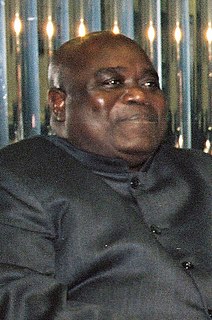
Laurent-Désiré Kabila or simply Laurent Kabila, was a Congolese revolutionary and politician who served as the third President of the Democratic Republic of the Congo from 1997 until his assassination in 2001.

The Democratic Republic of the Congo, also known as Congo-Kinshasa, DR Congo, the DRC, the DROC, or the Congo, and formerly Zaire, is a country in Central Africa. It is, by area, the largest country in sub-Saharan Africa, the second-largest in all of Africa, and the 11th-largest in the world. With a population of around 92 million, the Democratic Republic of the Congo is the most populous officially Francophone country in the world, as well as the fourth-most populous country in Africa and the 15th-most populous country in the world. It is a member of the United Nations, Non-Aligned Movement, African Union, and COMESA. Since 2015, the Eastern DR Congo has been the site of an ongoing military conflict in Kivu. The capital and largest city is Kinshasa.

The national flag of the Democratic Republic of the Congo is a sky blue flag, adorned with a yellow star in the upper left canton and cut diagonally by a red stripe with a yellow fimbriation. It was adopted on 20 February 2006. A new constitution, ratified in December 2005 and which came into effect in February 2006, promoted a return to a flag similar to that flown between 1963 and 1971, with a change from a royal blue to sky blue background. Blue represents peace. Red stands for "the blood of the country's martyrs", yellow the country's wealth; and the star a radiant future for the country.

The DR Congo national football team, recognised by FIFA as Congo DR, represents the Democratic Republic of the Congo in men's international football and it is controlled by the Congolese Association Football Federation. They are nicknamed the Leopards. The team is a member of FIFA and the Confederation of African Football (CAF).
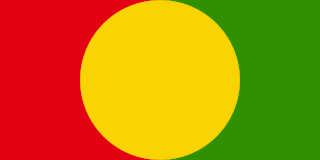
The Democratic Forces for the Liberation of Rwanda is an armed rebel group active in the eastern Democratic Republic of the Congo. It has survived by preying on the Congolese population. As an ethnic Hutu group opposed to the ethnic Tutsi influence, the FDLR is one of the last factions of Rwandan rebels active in the Congo. It was founded through an amalgamation of other groups of Rwandan refugees in September 2000, including the former Army for the Liberation of Rwanda (ALiR), under the leadership of Paul Rwarakabije. It was active during the latter phases of the Second Congo War and the subsequent insurgencies in Kivu.
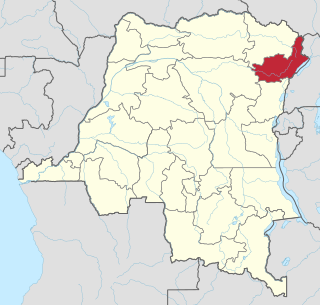
Operation Artemis, formally European Union Force (EUFOR) Democratic Republic of the Congo, was a short-term European Union-led UN-authorised military mission to the Democratic Republic of the Congo during the Ituri conflict. ARTEMIS is considered the first military operation led by the EU, the first autonomous EU operation, the first rapid response mission of the EU, first operation outside Europe, first operation applying the principle of the framework nation and first example of "relay operation", conducted in cooperation between the EU and the United Nations. The deployment of EUFOR troops quickly decreased the conflict's intensity. It marked the first autonomous EU military mission outside Europe and an important milestone in development of the European Security and Defence Policy.
The Agence Nationale de Renseignements (ANR) is a government intelligence agency of the Democratic Republic of the Congo. The role of the agency is to ensure "internal security and external security" of the state. The agency was strongly criticized for the disrespect of human rights by several organisations. Inzun Kakiak has led the agency since 2019.

The Société Nationale des Chemins de Fer Zaïrois (SNCZ) was the state railway company in Zaire formed in 1974 by combining several privately owned railways. It suffered from lack of maintenance of the tracks and rolling stock, weak management, and external factors such as the Angolan Civil War and the collapse of the economy of Zaire under President Mobutu Sese Seko. Despite two projects funded by the World Bank, it had virtually ceased to function by the 1990s. It was replaced in 1995 by the short-lived private company SIZARAIL, which in turn was replaced by the present Société nationale des chemins de fer du Congo.

Canada–Democratic Republic of the Congo relations refers to the bilateral relationship between Canada and the Democratic Republic of the Congo. Canada has an embassy in Kinshasa and D.R. Congo has an embassy in Ottawa.

Marcel Antoine Lihau or Ebua Libana la Molengo Lihau was a Congolese jurist, law professor and politician who served as the inaugural First President of the Supreme Court of Justice of the Congo from 1968 until 1975 and was involved in the creation of two constitutions for the Democratic Republic of the Congo.

Nicolas Kazadi is a Congolese politician and career diplomat who has been Ambassador-at-large for the Democratic Republic of the Congo since 7 March 2019 and Minister of Finance since 12 April 2021.

Congolese nationality law is regulated by the Constitution of the Democratic Republic of the Congo, as amended; the Congolese Nationality Code, and its revisions; the Congolese Civil Code; and various international agreements to which the country is a signatory. These laws determine who is, or is eligible to be, a national of the Democratic Republic of the Congo. The legal means to acquire nationality, formal legal membership in a nation, differ from the domestic relationship of rights and obligations between a national and the nation, known as citizenship. Congolese nationality is typically obtained under the principle of jus soli, i.e. by birth in the Democratic Republic of the Congo, or jus sanguinis, born abroad to parents with Congolese nationality. It can be granted to persons with an affiliation to the country, or to a permanent resident who has lived in the country for a given period of time through naturalization.

Democratic Republic of the Congo–Turkey relations are the foreign relations between the DR Congo and Turkey. Turkey has an embassy in Kinshasa since 1974, and the DR Congo opened its embassy in Ankara in 2011.
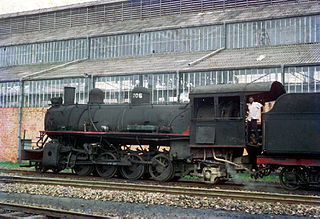
The Compagnie du chemin de fer du bas-Congo au Katanga (BCK) was a railway operator in the Congo Free State, Belgian Congo and later in the Democratic Republic of the Congo and Zaire. Most of the lines were in the southern Katanga Province, with links to the Kasai River for transport of mineral exports down to Kinshasa and onward to the port of Matadi, and a link to the Angolan railway network for transport to Lobito on the Atlantic.
The Société des Chemins de fer Katanga-Dilolo-Léopoldville (KDL) was a railway concession owner in the Congo Free State, Belgian Congo. The network was built, maintained and operated by the Compagnie du chemin de fer du bas-Congo au Katanga (BCK).
Sizarail was a railway company formed by foreign investors that briefly operated the railway network in Zaire between 1996 and 1997. It took over from the state-owned operator in an attempt to revive the railway, which had virtually ceased to operate despite being a critical source of revenue from mineral exports. Operations quickly improved, and the company earned a small profit in the first year. However, advancing rebel forces closed it down and re-nationalized the railway.
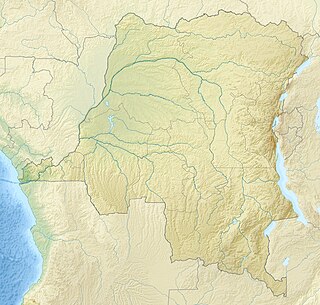
The Twangiza-Namoya gold belt is a belt of gold deposits in the east of the Democratic Republic of the Congo. Artisanal working of alluvial deposits dates back to the 1920s. More systematic exploration and exploitation took place in the colonial era and continues up to the present, although civil war and militia attacks have periodically disrupted operations and have caused several changes of ownership of the concessions.
The Société Minière et Industrielle du Kivu (Sominki) was a privately held mining company of Zaire. It operated gold and tin mines, mostly in South Kivu province, between 1974 and 1997. The acquisition of its mining assets by Banro Corporation of Canada was complicated by the First Congo War in 1996–1997, followed by expropriation of the mines by the new Democratic Republic of the Congo (DRC) government. Eventually Banro gained the right to exploit the gold mines.
The following lists events that happened during 1974 in Zaire.